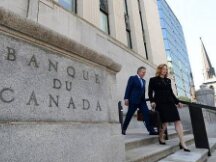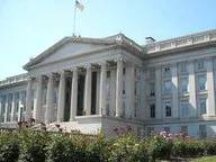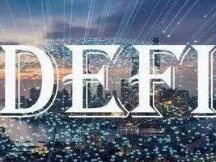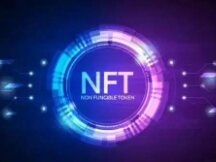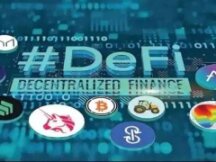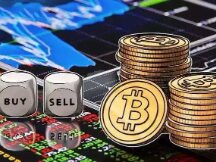SEC: Declaration on decentralized financial risks, rules and procedures
In recent years, DeFi (decentralized finance) has provided more opportunities for the business, but it has also presented significant risks and challenges for management, investors, commerce and the financial industry. The United States Securities and Exchange Commission (SEC) has issued a "Statement of Uncertain Financial Risks, Regulations and Timeframes" of the DeFi code drafted by the Fintech Institute at Renmin University of China. This article describes DeFi's current legal history, the role of the United States Securities and Exchange Commission (“SEC”) in governance, and describes the risks DeFi faces.
introduction
Whether it's news, social media, big entertainment, or human capital, cryptocurrency is very popular. However, this term is what is broad and amorphous within DeFi's scope, of everything from tokens to non-fungible tokens, including DeFi, to decentralized finance. For readers new to DeFi, the context may vary. Typically, DeFi is an attempt to reinvent an existing financial process by requiring setup, integration, and an open source blockchain-based smart contract. While most DeFi functionality occurs on the Ethereum blockchain, DeFi applications and platforms can be designed to use a blockchain that supports certain types of writing or encoding.
While DeFi offers many options, it presents significant risks and challenges for regulators, investors, and financial institutions. ~While the potential for commercial gain is uncertain, skepticism still hinges on DeFi's new acquisitions. Questions such as "Who controls the US DeFi market?" And "Why are administrators interfering?" surges on social networks. These questions are very important, and the answers to these questions are important to both lawyers and non-litigants.
This short article describes the current context of DeFi governance, the responsibilities of the United States Securities and Exchange Commission (“SEC”) and highlights the key issues that all stakeholders are adapting to and need to be addressed.
Common attributes of investments
Many DeFi devices are similar to traditional financial services. Decentralized applications or dApps running on the blockchain allow users to acquire assets or loans after the proclamation of ownership, just like a traditional loan. Other products provide the digital deposit process and then earn money. Both types of products offer direct and indirect recovery of lending access to other DeFi capabilities.
Additionally, web tools can help users identify or invest in DeFi with maximum efficiency. Another application allows users to generate income or earn money through trading. There are also tokens used to encode and track the value of a secure exchange of country records. These tokens can be redeemed and used in other DeFi applications. Therefore, we do not need to know all the technology of DeFi, but the digital products and these activities are related to the duties and responsibilities of the United States Securities and Exchange Commission.
Finances are often petty and there is no doubt that investing is often at the heart of DeFi operations. DeFi projects of all kinds aren't just about developing new digital tokens. Developers have also developed smart contracts that provide investment services to individuals, allow a variety of variations to handle work, and provide quick and easy replacement tools for multiple platforms and processes. There are also activities that highlight DeFi's abilities to measure the benefits of speeds, costs, and business adjustments.
Many DeFi tasks progress on notifications and have certain capabilities. Improving DeFi is particularly important given that blockchain supports the need for smart contracts still in its infancy. DeFi is the start of the investment. These investments include risk taking, which seeks to increase the expectation of a nominal increase in value, or those seeking to take back the risk or close investments.
Unregulated business with limited functionality
Participants who receive money from investors or provide legitimate services often have legal obligations. In defiance of these laws, many DeFi supporters have said DeFi is in jeopardy and their capabilities could be lost, but failed to provide the details necessary to measure the occurrence and severity of the risk. Put simply, "buyers should be careful" venture capitalists should run the risk of incurring losses. As a result, many DeFi participants have agreed to be cautious when investing in new businesses, and many professionals and experts believe that there are significant risks. ~
DeFi has other ways to set up, shut down, and manufacture products, but DeFi hasn't changed their business model and their human body. Some rules and facts also apply to DeFi based on traditional finance. Without strict rules, there will be jobs that will not be respected and there will be no internal control.
While the benefits can be great enough, participants will allow others to become victims, and the risk of being arrested and fined does not have to be huge, which makes this possible. And in the absence of the need for disclosure, data asymmetry attracts high net worth investors and insiders, to the detriment of ordinary investors and low income investors. Thus, the current approach to “client risk” of DeFi participants is not a necessary basis for creating a new era in the financial sector. Without hope of good behavior and efficiency in the management of these concepts, the company is vulnerable to corruption, especially through fraud, commercial enterprises, in other words, market capitalization and the asymmetry of the big data. Business trust and commitment declines over time. ~
Change, good governance of business will flourish, and I think American investment is a prime example of that. Markets often follow standards that lead to less trust and transparency, and are often the first choice of investors looking to make money. Businesses perform better because safety laws not only deal with liability and charges, but also provide and create significant business benefits to help resolve issues. However, in the emerging world of DeFi, control systems that provide critical protection in other markets are not yet approved. ~
Who is responsible for the DeFi policy?
Many U.S. government agencies have policies governing all aspects of DeFi, including the Office of Justice, the Anti-Money Laundering Act, the Internal Revenue Service, and the Future of Commerce. , and the SEC. Although many schools have special rules, customers who join DeFi often don't receive the same level of compliance and strong publicity as other national retailers. For example, the differences between participants, activities and DeFi products include activities related to safety and security and will therefore be decided by the SEC. However, DeFi participants in SEC policy are not registered, and when the board continues to support DeFi participants interact with the board, if capital is disclosed Beyond regulation, investors and stakeholders will see these companies follow the same path. . You have to understand that it is higher. General financial markets are riskier.
The role of the SEC
As SEC staff, we have a responsibility to ensure that business transactions are fair and provide a level playing field for all investors. It is hoped that this objective will be supported by DeFi partners. The SEC tool is available to them, from power management to a variety of exceptions or non-control solutions. It is important to note that the DeFi development team should contact the Financial Technology and Innovation Strategy Center (“FinHub”) or another agency if they are unsure whether a project is in their hands. of the SEC. These facilities have professionals who are well versed in digital asset issues, so their involvement is invaluable.
If the Defi project does not fit into the existing framework, the team should consult with the SEC before entering the market. The DeFi team can suggest intervention solutions to lead the discussion and achieve better results. SEC staff cannot provide legal information, but are always ready to listen to advice and provide comment. If your project is SEC compliant, it is important that the SEC has a good idea of how to incorporate these new technologies into its governance process. This allows innovation to succeed when government laws protect businesses and investors.
Conflicts
It is not for the SEC to stop traders from falling, and our goal is not to limit investor stakes and opportunities. Our goal is to determine investments by providing investors with important data. How much value would you invest? We are also committed to ensuring that the market is fair and not rigged. With this in mind, the DeFi community needs to address two specific issues.
not transparent
First, while the industry is generally known for public channels, DeFi investments are not transparent. We are concerned that there is no transparent polarized business model in which both the trader and the insider benefit, while the trader will have more risk, lower costs and ultimately not being on time.
Most of DeFi's income comes from investments and other professional investors. I don't know how well known this is in the DeFi customer trading community, but it's a simple financial system that gives the customer a legitimate talk or not. powers. Benefits include rules and the ability to share control with peers. Although this inside information is seldom publicly available, it can affect the value and value of your investment. In DeFi, the operator is already working on the negative, and this data asymmetry makes the problem even worse.
Some argue that DeFi is more fair and transparent because most of its business ventures are based on public rights. However, only certain people can read and understand the rules, and even the expert can remember the disadvantages or risks of this job. The quality of your fonts can vary from project to project and can have a major impact on your budget and your security. Since DeFi must be popular with the capital community, it should not be assumed that the majority of participants can or intend to run their own test networks to understand the risks involved. . It is irrational to create a financial system in which investors also have to translate complex codes. ~
Put simply, if a retailer invests $ 2,000 in a risky programmable asset, it is not worth hiring an expert to review the rules to ensure that it is in advertised compliance. Instead, the merchant should trust the information obtained through marketing, advertising, word of mouth, and social media. Expert investors, on the other hand, can hire experts, engineers, economists, etc. before making an investment decision. This excellence has historically existed in the financial industry, but DeFi makes it even heavier.
DeFi plays an important role in overseeing and eliminating intermediaries outside of existing business and protection lines. This will help the marketer assess the resources needed for efficiency and legitimacy by restricting their access to financial advisors or other intermediaries. While financial resources have traditionally reduced fraud and risk metrics, there has been little similarity in DeFi.
Last name
The second challenge with DeFi is that the market has an impact on the transition. DeFi trading is done on a blockchain, all exchanges are recorded, cannot be interacted with and are visible to everyone. However, this view is only linked to specific characters. Due to anonymity, the blockchain discloses the address of the blockchain where the asset was sent or received and does not reveal the identity of its administrator.
If there is no good way to verify the authenticity of a trader or smart contract owner, it can be difficult to know whether the property and packaging is affected or not by products of the market. purchase rigged. Someone is a colleague or trades multiple wallets using a bot. There are special laws that prohibit transactions such as fraudulent transactions and price controls on securities, and good investments depend on reliable data and fair trade. Anonymity makes it easy to cover activities such as business management, making it almost impossible for investors to distinguish the people involved in the activity marketed by the organic market. In DeFi, markets are often dependent on the price, volume, and strength of assets, and rigged markets can make it easy for investors to lose money. When a market takes place outside the public chain, it is more difficult to assess whether the market is legitimate or not.
Granted, in some ways DeFi is the buzzword with the name. The use of cryptocurrency has really been a part of the Bitcoin world and has since appeared in all blockchain worlds. Investors, however, have long been accustomed to relative interference as they have given up a certain degree of confidentiality through the real name system with companies. In return, investors benefit from fair, bigger, more profitable and more efficient business practices with less scrutiny and fraud.
And on DeFi, I think most companies do it not because they want better privacy, but because they want better. Although some DeFi users advocate financial anonymity, the tasks related to the anonymity issue will be accomplished and investors can trust the asset. impact real investors and are not controlled by expected value. Activities related to this matter will generally comply with SEC rules and other liability obligations, including those under the Money Laundering Secrecy and the Prevention of Terrorism Act.
system
We support innovation, but this does not affect our commitment to justice. We must ensure that all financial markets are safe and provide fair opportunities for investors. DeFi is both a moment and a challenge that we face together. Some DeFi functions fall into the hands of the SEC, while others struggle to comply with these rules.
Many DeFi projects have indicated a desire to work legally, which is a good sign. I believe in their honesty and hope that they will devote their resources in the same spirit to working with the staff of the SEC. For DeFi issues, it is best if all parties find a solution. Unsustainable business ventures against potential investors to promote fair trade are a untimely opportunity and, in extreme cases, can result in significant losses. When thinking of a new financial system, manufacturers have a responsibility to ensure quality, prompt delivery, and innovation, and believe that it should be a system that minimizes costs. ~
Such procedures should be effective for the riskiest campaigns without having to deal with hype or misrepresentation. There is also a need to run the business intermittently, but requires adequate protection against major shocks, including the potential for immediate disruptions. In a decentralized network with decentralized management and competing interests, the role of the regulator is to create an incentive to be efficient for all systems and to do justice to weaker participants.
SEC staff participated in discussions with DeFi experts and our attitude was open. It can be difficult to do this process at night, but what we really need is to reflect and support the new role.

Scan QR code with WeChat



